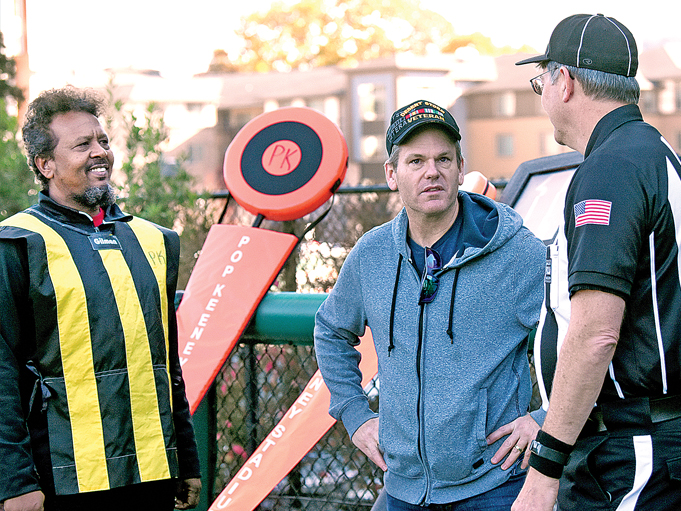Even if you’re not a fan of classical music, you likely recognize the first eight notes of Beethoven’s Fifth Symphony when you hear them. Didn’t major in English lit? No matter. You probably know the Charles Dickens masterpiece A Tale of Two Cities begins with the words, “It was the best of times, it was the worst of times.”
The words and notes that follow those beginnings are classics and probably would be works of art even with less memorable starts. But those openers have burned themselves into our memories and are instantly connected with the overall compositions.
A positive start doesn’t guarantee success, but it is almost impossible to tackle any task without getting off on the right foot. So it is in officiating. The myriad tasks that must be handled before the opening serve, tip, pitch or kick may seem like chopped liver, but that is hardly the case.
The process begins with accepting the assignment. If your assigner uses an online service, be sure your schedule is up to date. Don’t leave the impression you’re open when you know you’re already working a game or have a family commitment.
If you need to return a contract, do it promptly. Paper contracts are rare these days; there is no excuse for dilly-dallying when it comes to handling such correspondence.
Contact your partner(s), preferably no later than the day before the game. Confirm a gathering place and time if you’re traveling together, or estimated arrival and meeting point if traveling separately. Account for traffic, weather and construction that may affect travel time. If officials in your sport have choices regarding uniform color and style, make those decisions at that time.
After your on-time arrival at the game site, seek out the game manager, who will greet you and guide you to the room you will use to change. That may be a locker room, coaches office, restroom, classroom or broom closet. Whether it’s the Taj Mahal or a dark, dank, crowded space, make the best of it. Like the weather, you can’t do anything about it, so keep a positive attitude. You’ll be spending comparatively little time there anyway.
You’re probably sick to death of reading about the need for a pregame meeting. Well, here we go again. Even if you’ve worked with the same partner or crew for eons, each game presents different challenges and opportunities. And if you haven’t worked together before, the need for a thorough discussion is even more important. Teams change players, coaches and strategies, not only from season to season but from one game to the next. As the season goes on, the less successful teams may overhaul their game plans hoping to shake things up. Discuss how you will react to those or other changes.
Enter the field or court together. Have a little bounce in your step, like you’re happy to be there. People will begin to see you at that point. If your shoulders are slumped, your feet are dragging or you have a sourpuss facial expression, you are sending all kinds of negative messages. Moreover, that attitude will carry over to the game at hand.
If the rules of your sport require a pregame meeting with each head coach, handle it professionally. Exchange whatever information both sides require, tell the coaches, “Have a good game,” and walk away.
When a coin toss or a meeting with captains is required, remember the “three B’s.” Be jovial. Be brief. Be done.
Meet with scorers, timers, chain crew members, etc., as appropriate. Make them feel a part of the officiating crew. If the stuff hits the fan, they may be the only ones who can bail you out, so don’t take them for granted. Often you’ll get a condescending, “Don’t worry, Sonny (or Honey). We’ve been doing this since you were in diapers. We can handle it.” Remain friendly but firmly insist on going over procedures anyway, since you may do things slightly differently from other officials. If a member of the support team is belligerent to the point he or she is impossible to work with, seek out the game manager to find a replacement. Play that card carefully, however. In smaller towns, that person may be the mayor, school board president or church pastor. In a tug of war between a visiting official and pillar of the community, you lose every time.
Observe the players before play begins. If you see a player is missing required equipment or a part of his or her uniform is illegal, bring it to the coach’s attention before it becomes an issue in the game. That’s also a good time to watch the players warm up and gain clues as to their abilities. Can the point guard hit the three-ball? Does the center fielder have a cannon for an arm? Can the punter boom it? Any piece of information could be useful during the game.
If the national anthem is played, stand at attention. Don’t chit-chat with other officials, stretch or fidget.
When it’s finally time for the action to begin, be sure everyone is in place and ready to go. Then give a strong blast on the whistle or a commanding, “Play!” and let the fun begin.
How things go from there depends on a lot of factors. But your chances for success improve if you chart the right course from the get-go.
What's Your Call? Leave a Comment:
Note: This article is archival in nature. Rules, interpretations, mechanics, philosophies and other information may or may not be correct for the current year.
This article is the copyright of ©Referee Enterprises, Inc., and may not be republished in whole or in part online, in print or in any capacity without expressed written permission from Referee. The article is made available for educational use by individuals.














